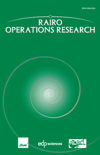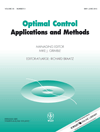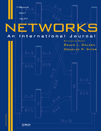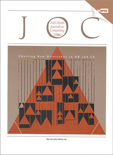
ENGINEERING OPTIMIZATION
Scope & Guideline
Shaping the Future of Optimization Across Industries
Introduction
Aims and Scopes
- Optimization Techniques and Algorithms:
The journal emphasizes various optimization methodologies, including linear programming, nonlinear programming, metaheuristics, and hybrid algorithms. It publishes research that contributes to the theoretical development of these techniques as well as their practical applications across engineering fields. - Application in Structural Engineering:
A significant portion of the journal's content is dedicated to structural optimization, including topology optimization, material selection, and design efficiency. The research often focuses on enhancing the performance and reliability of structural systems under various loading conditions. - Multi-objective Optimization:
The journal covers research in multi-objective optimization, addressing problems where multiple conflicting objectives must be considered. This includes studies that develop algorithms capable of finding Pareto-optimal solutions in engineering design and operation. - Sustainability and Eco-Design:
Recent publications reflect a growing emphasis on sustainable engineering practices. Research focuses on optimizing designs for energy efficiency, reducing material waste, and incorporating renewable resources into engineering solutions. - Uncertainty and Robust Optimization:
The journal increasingly addresses uncertainty in optimization problems, exploring robust optimization techniques that account for variability in parameters and conditions. This includes research on stochastic models and sensitivity analysis.
Trending and Emerging
- Data-Driven Optimization:
There is a growing trend towards incorporating data-driven approaches in optimization, particularly using machine learning and artificial intelligence. Research in this area focuses on utilizing large datasets to inform and enhance optimization processes, making them more adaptive and efficient. - Integration of Renewable Energy Sources:
Emerging research is increasingly focused on optimizing systems that integrate renewable energy sources, such as solar and wind, into existing infrastructure. This includes optimization of energy management systems and hybrid energy solutions. - Advanced Multi-Scale and Multi-Physics Optimization:
Recent publications have begun to explore multi-scale and multi-physics optimization problems, where interactions between different physical phenomena are considered. This trend reflects the complexity of modern engineering challenges. - Resilience and Robustness in Optimization:
There is a heightened emphasis on resilience and robustness in engineering designs, particularly in response to uncertainties and extreme conditions. Research is increasingly focused on developing optimization strategies that ensure system reliability under variable conditions. - Smart Manufacturing and Industry 4.0:
The journal is witnessing an increase in research related to smart manufacturing processes and the application of optimization techniques in the context of Industry 4.0. This includes optimization of supply chains, production scheduling, and resource allocation in intelligent manufacturing environments.
Declining or Waning
- Traditional Linear Optimization:
There has been a noticeable decrease in research focused solely on traditional linear optimization techniques. As newer and more complex problems emerge, researchers are gravitating towards more advanced methodologies that address nonlinearities and multi-objective scenarios. - Basic Heuristic Methods:
The prevalence of basic heuristic approaches has declined as the field moves towards more sophisticated metaheuristic and hybrid algorithms. This shift indicates a preference for methods that can provide better solutions to complex problems. - Single-Objective Optimization:
Research focusing on single-objective optimization problems is becoming less common. The trend indicates a growing recognition of the importance of addressing multiple objectives simultaneously, leading to a reduction in studies that do not consider this aspect. - Purely Theoretical Studies:
There has been a gradual decline in purely theoretical optimization studies without practical applications. This shift suggests an increasing demand for research that not only advances theory but also demonstrates practical relevance in engineering contexts.
Similar Journals

RAIRO-OPERATIONS RESEARCH
Pioneering impactful studies in operations research and computer science.RAIRO-Operations Research is a distinguished journal published by EDP Sciences S A, focusing on the intricate fields of operations research, management science, and computer science applications. Established in 1977, this French-based journal encompasses a rich legacy of contributing to theoretical advancements and practical applications that equip researchers, professionals, and students with the insights necessary to navigate complex decision-making environments. With a notable Scopus ranking in various categories, including a Q3 position in Computer Science Applications, Management Science and Operations Research, and Theoretical Computer Science, the journal aims to foster innovation and share impactful research findings. As an insightful platform, RAIRO-Operations Research is essential for those seeking to deepen their understanding and enhance their expertise in operational methodologies, while also offering a range of access options for its wide readership. Delve into the journal to explore transformative research that pushes the boundaries of operations research.

OPTIMAL CONTROL APPLICATIONS & METHODS
Connecting experts to drive automation and optimization forward.OPTIMAL CONTROL APPLICATIONS & METHODS, published by WILEY, is a prestigious academic journal dedicated to advancing the field of applied mathematics, control, and optimization. With an impressive impact factor in its respective categories—ranking in the second quartile for Applied Mathematics, Control and Optimization, and Control and Systems Engineering—the journal serves as a vital platform for disseminating innovative research findings and methodologies from 1980 to 2024. The journal is indexed in Scopus, with notable rankings in its discipline, highlighting its significance in the scientific community; specifically, it is ranked 143rd in Applied Mathematics and 35th in Control and Optimization, underscoring the quality and relevance of the research it publishes. Although not an open-access journal, it provides essential insights and methodologies of paramount importance to researchers, professionals, and students committed to the fields of control theory and systems engineering. It continues to foster knowledge and collaboration among experts to address complex challenges in automation and optimization.

Pacific Journal of Optimization
Empowering Research Through Optimization InsightsPacific Journal of Optimization, published by YOKOHAMA PUBL, is a premier academic journal dedicated to the field of optimization, focusing on both theoretical developments and practical applications. With its ISSN 1348-9151, this journal provides a vital platform for researchers, professionals, and students to disseminate their innovative findings and to stay abreast of emerging trends in optimization. Although the journal’s coverage in Scopus was discontinued in 2012, it remains a significant resource for academics seeking to deepen their understanding of optimization methodologies across various disciplines. The journal promotes an enriching exchange of ideas, fostering advancements that are essential in the evolving landscape of operations research and decision-making processes. While it currently does not operate under an Open Access model, its content is pivotal for those aiming to contribute to and learn from cutting-edge research in optimization.

STRUCTURAL AND MULTIDISCIPLINARY OPTIMIZATION
Pioneering Research in Structural OptimizationSTRUCTURAL AND MULTIDISCIPLINARY OPTIMIZATION, published by Springer, stands at the forefront of research in the fields of computer graphics, computer-aided design, control and optimization, and software engineering. With an impressive Impact Factor, it maintains a notable position within Q1 quartiles across various categories, highlighting its esteemed contribution to academia and industry, and further exemplified by its robust Scopus rankings. The journal provides an Open Access option, facilitating wider dissemination of critical research findings to promote collaborative development across disciplines. Based in Germany, this journal serves as a crucial platform for researchers, professionals, and students, engaging them in high-quality discussions and innovative solutions that push the boundaries of structural optimization. Covering a broad scope of topics, it invites submissions that not only advance theoretical frameworks but also align with practical applications, making it an essential resource for anyone looking to impact the evolving landscape of engineering and technology.

Optimization Letters
Unveiling Novel Methodologies in OptimizationOptimization Letters, published by SPRINGER HEIDELBERG, is a leading journal dedicated to the field of optimization, serving as a platform for high-quality research that spans across mathematics, control, and management disciplines. Based in Germany, this journal has been pivotal in advancing the theory and applications of optimization since its inception in 2007, converging a wide scope of innovative methodologies and practical applications up until 2024. With an impressive Scopus ranking placing it in the Q2 category for both Business, Management and Accounting (miscellaneous) and Control and Optimization, it reflects the journal's commitment to disseminating impactful research. Researchers and practitioners benefit from the journal’s rigorous peer-review process, enhancing its credibility within the academic community. Optimization Letters invites contributions that encapsulate novel findings and methodologies that drive forward the understanding and applications of optimization, making it an invaluable resource for those in related fields.

Energy Systems-Optimization Modeling Simulation and Economic Aspects
Unlocking the Potential of Energy Systems Through Simulation Excellence.Energy Systems: Optimization Modeling Simulation and Economic Aspects is a premier journal published by SPRINGER HEIDELBERG, focusing on the intersection of energy systems, economic modeling, and simulation techniques. With an ISSN of 1868-3967 and an E-ISSN of 1868-3975, this journal caters to a diverse audience, including researchers, professionals, and students seeking to deepen their knowledge in the rapidly evolving field of energy economics and systems optimization. The journal holds an esteemed position in the academic community, with impressive Scopus rankings that place it in the top quartile for Economics and Econometrics, as well as Modeling and Simulation. The Q2 and Q3 quartile categorizations underscore its impact and relevance within these disciplines. Covering topics from algorithmic modeling to economic analysis in energy systems, the journal serves as a critical resource for those aiming to advance sustainable energy practices and policies. As of 2023, the journal continues to innovate and publish high-quality research, having opened its contributions from 2010 to 2024, thus maintaining a rich archive of knowledge for impactful energy solutions.

NETWORKS
Fostering Knowledge in the Evolving Landscape of NetworksNETWORKS, an esteemed journal published by Wiley, serves as a premier platform for the dissemination of high-quality research in the fields of computer networks, communications, hardware architecture, and information systems. With an ISSN of 0028-3045 and an E-ISSN of 1097-0037, the journal has been at the forefront of networking studies since its inception in 1971 and continues to thrive, boasting a convergence period that extends into 2024. Recognized for its rigorous peer-review process, NETWORKS is placed in the Q1 and Q2 quartiles of various categories, underscoring its significant impact and relevance in the realm of computer science. Although there is no open access option currently available, the journal remains a vital resource for researchers, professionals, and students who seek to navigate the evolving landscapes of technology and innovation. With its robust Scopus rankings and a growing readership, NETWORKS is dedicated to fostering advancements in network theory and practice, making it an essential read for those at the cutting edge of this dynamic field.

EURO Journal on Computational Optimization
Shaping the Future of Optimization Techniques and ApplicationsEURO Journal on Computational Optimization, published by ELSEVIER, is a leading open-access journal that has been advancing the field of computational optimization since its inception in 2013. Catering to a diverse audience of researchers, professionals, and students, this journal addresses critical developments in computational mathematics, control and optimization, and management science. With an impressive Q1 category ranking in multiple areas, including Computational Mathematics and Management Science and Operations Research, the journal serves as a pivotal platform for disseminating groundbreaking research and innovative methodologies. Its commitment to open access ensures that valuable insights are readily available to the global academic community. With a continuous publication timeline through 2024, the EURO Journal on Computational Optimization is positioned at the forefront of its field, fostering collaboration and innovation in optimization techniques and applications.

COMPUTATIONAL & APPLIED MATHEMATICS
Bridging Theory and Practice in Mathematical SciencesCOMPUTATIONAL & APPLIED MATHEMATICS, published by SPRINGER HEIDELBERG, serves as a premier platform for the dissemination of high-quality research and advancements in the fields of applied and computational mathematics. With an esteemed reputation bolstered by a Q2 ranking in both Applied Mathematics and Computational Mathematics categories, this journal delivers invaluable insights that cater to the scholarly community, including researchers, professionals, and students. It features rigorous peer-reviewed articles that cover a wide array of mathematical models, numerical algorithms, and their applications across various scientific and engineering domains. The journal has been in circulation since 2003 and remains relevant through its commitment to publishing cutting-edge research until 2024. Though not open access, its impact within the academic landscape is significant, with Scopus rankings placing it in the top quartiles of its fields. Whether you are seeking to stay updated on the latest findings or contribute your own work, COMPUTATIONAL & APPLIED MATHEMATICS is an essential resource for those committed to the advancement of mathematical sciences.

INFORMS JOURNAL ON COMPUTING
Illuminating the Future of Information ScienceINFORMS JOURNAL ON COMPUTING, published by INFORMS, stands as a quintessential platform for disseminating cutting-edge research and innovative methodologies in the realms of computing, information systems, and operations research. Since its inception in 1996, this journal has consistently maintained a prestigious Q1 quartile ranking across multiple categories, including Computer Science Applications, Information Systems, and Management Science and Operations Research, reflecting its significant impact and relevance in the academic community. The journal serves as a vital resource for researchers, professionals, and students alike, fostering interdisciplinary dialogue and the advancement of theoretical and practical contributions in computing. With no open access restrictions, it remains accessible to those engaged in the pursuit of knowledge and innovation in a rapidly evolving field. Housed in the United States, the journal continues to thrive, enriching the discourse in technology and its applications until 2024 and beyond.